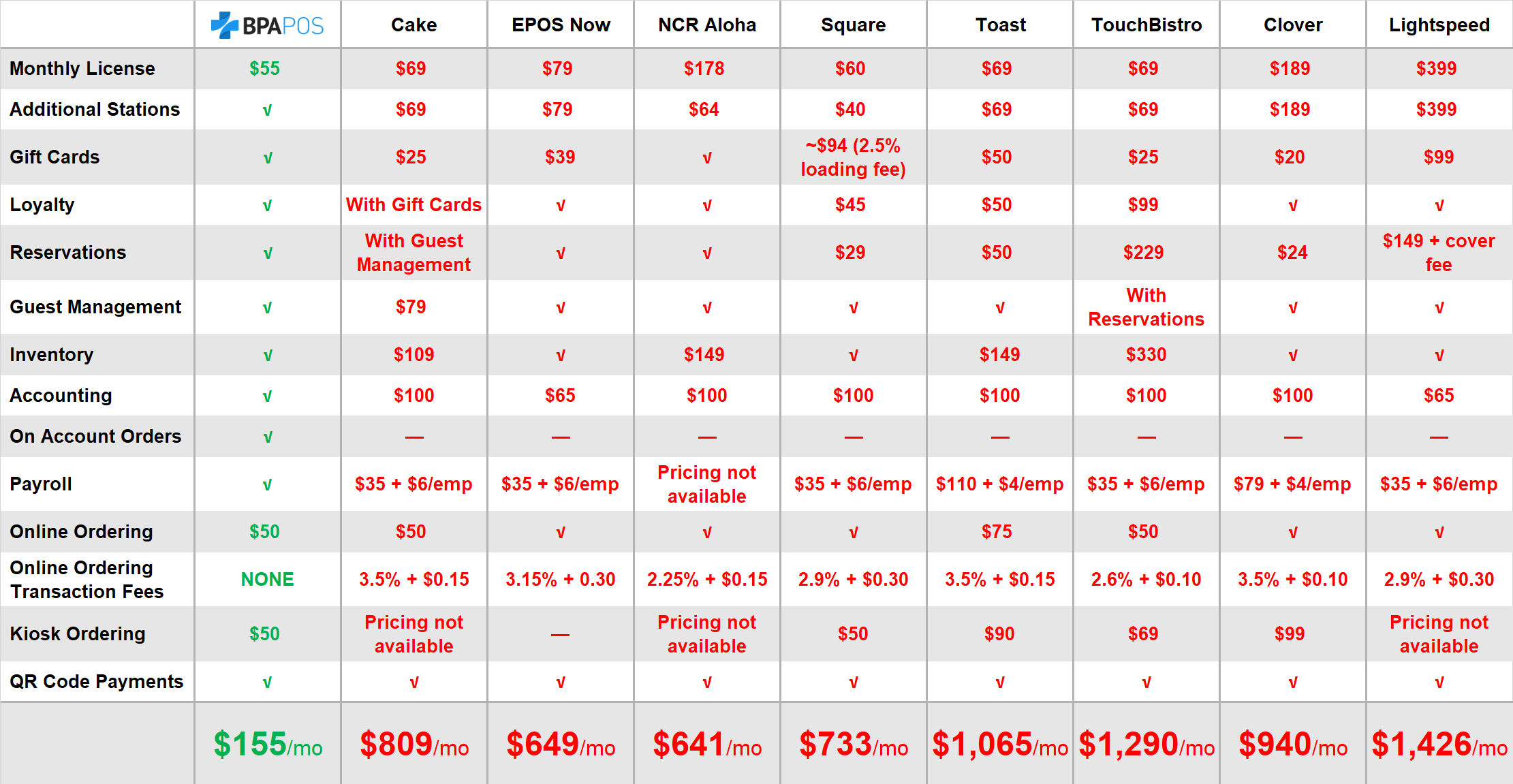Introduction
Running a restaurant is no easy feat. From managing orders and inventory to ensuring top-notch customer service, there's a lot on your plate—literally! But what if I told you there's a tool that can make all these tasks easier? The benefits of POS systems in restaurants are numerous and game-changing.
You might wonder how this technology can impact your daily grind. Well, imagine seamless order management, real-time menu updates, and simplified kitchen communication—all at your fingertips. These aren't just buzzwords; they're realities that can transform how you run your business.
Benefits of POS Systems in Restaurants Operations
We have been serving the restaurant owners and their businesses for over 30 years. The biggest complaint we get when talking with business owners is that they are paying way too much for their point of sale system. Investing in a solid POS system is a total game-changer but shouldn't have you stressed about having to make a certain amount of sales just to break even with your overhead.
Here at BPA POS, we have done the heavy work and compiled a list of commonly used POS systems, what they offer (if they had it online without having to do a demo) and their monthly fees.

A higher price tag doesn't always mean you get more. Many of these providers have hidden fees behind their promotion offer to get you to sign a contract that locks you in.
We have made our systems and software very affordable without skimping on the features. These systems are designed to streamline operations and make managing a restaurant so much easier. We've seen firsthand how they can transform the way you run your business.
Tired of overpaying for features that should already be included in your point of sale? Give us a call at (801) 336-3303 and we can either help you decrease your overhead or start you off on the right foot if you are just starting out.
Efficient Order Management
With a restaurant POS system, your servers can input orders directly into the system. No more running back and forth to the kitchen or trying to decipher handwritten tickets. The orders go straight to the prep stations, reducing errors and speeding up the process.
Improved Table Turnover
POS systems help you turn tables faster by streamlining ordering and payment. Servers can send orders to the kitchen instantly and print checks as soon as customers are ready. More efficiency means more customers served during peak hours, and that translates to increased revenue.
Real-time Menu Updates
Need to 86 a dish or adjust prices on the fly? No problem. With a POS system, you can make real-time menu updates with just a few taps. Your servers will always have access to the most current menu, preventing any confusion or disappointment for your guests.
Simplified Kitchen Communication
A restaurant POS bridges the gap between the front and back of house. Kitchen staff can view incoming orders on a display screen, allowing them to manage their workload effectively. Any modifications or special requests are clearly noted, reducing the chance of errors and ensuring order accuracy.
How POS Systems Enhance Customer Experience in Restaurants
As a restaurant owner, you are always looking for ways to improve service and create a better dining experience for your customers. A good POS system can make a world of difference in this department. There are many POS system benefits for restaurants so that everything runs smoothly.
Personalized Service
POS systems allow you to collect customer data and preferences. This means your servers can access a guest's order history, dietary restrictions, and favorite dishes, enabling them to provide tailored recommendations and ensure a satisfactory experience.
Faster Order Processing
With a POS system, servers can input orders directly into the system using touchscreens or handheld devices. The orders are instantly sent to the kitchen, eliminating the need for servers to manually write down orders and physically deliver them. This significantly speeds up the ordering process and reduces wait times for customers.
Accurate Order Tracking
POS systems digitally track orders from start to finish. This reduces the risk of lost or forgotten orders, ensuring that customers receive their food promptly and accurately. If there's ever an issue, servers can easily check the status of an order and provide updates to the customer.
Convenient Payment Options
Modern POS systems support various payment options, including credit cards, debit cards, mobile payments, and gift cards. This convenience allows customers to pay using their preferred method, enhancing their overall dining experience. Plus, contactless payment options have become increasingly important post-pandemic, minimizing physical contact and promoting hygiene.

Advantages of Inventory Management with Restaurant POS Systems
Inventory management is crucial for any restaurant's success. It directly impacts your bottom line and can make or break your profitability. That's where a restaurant POS system comes in handy.
Real-time Stock Updates
POS systems integrated with inventory management software provide real-time updates on stock levels. As items are sold, the system automatically deducts them from the inventory count. This gives you a clear picture of what's in stock at any given moment, helping prevent stockouts and overstocking.
Automated Reordering
Some advanced POS systems can be set up to automatically reorder ingredients when stock levels fall below a predetermined threshold. This saves time and ensures that you never run out of essential items. Automated reordering also helps maintain optimal stock levels, reducing waste due to overstocking.
Reduced Food Waste
By closely monitoring inventory levels and sales data, POS systems help minimize food waste. You can identify slow-moving items and adjust purchasing accordingly, ensuring that ingredients are used before they spoil. Plus, by tracking portion sizes and recipe costs, you can optimize food usage and reduce waste due to overproduction.

Improved Cost Control
POS systems provide detailed insights into food costs, allowing you to identify areas where you may be overspending. By tracking restaurant ingredient costs and menu item prices, you can make informed decisions about pricing, portion sizes, and menu engineering. This level of cost control helps maintain profitability and stay competitive in the market.
Boosting Sales and Profitability with POS Systems in Restaurants
As a restaurant owner, boosting sales and profitability is always top of mind. The right restaurant point of sale system can be a powerful tool in achieving those goals along with streamlining operations.
Upselling Opportunities
POS systems can be programmed to suggest upsells and add-ons based on a customer's order history or current selection. For example, if a customer orders a burger, the system might prompt the server to suggest adding fries or a drink. These subtle upselling prompts can significantly increase the average check size and boost overall sales.
Targeted Promotions
With the customer data collected by POS systems, you can create targeted marketing campaigns and promotions. Send personalized offers to customers on their birthdays or anniversaries, or promote specific menu items to customers who have ordered similar dishes in the past. This targeted approach helps increase customer loyalty and drives repeat business.
Detailed Sales Reports
POS systems generate detailed sales reports that provide valuable insights into your restaurant's performance. Track sales by time period, menu item, server, or customer, identifying trends and areas for improvement. These reports can also help identify peak sales hours, allowing you to optimize staffing and inventory levels to maximize profitability.
Increased Efficiency
By automating many manual tasks, such as order taking and payment processing, POS systems significantly increase operational efficiency. Servers can handle more tables, and kitchen staff can prepare orders more quickly and accurately. This increased efficiency translates into higher sales volumes and improved profitability, as you can serve more customers without increasing labor costs.
Integrating Online Ordering and Delivery with Restaurant POS Systems
In today's digital age, online ordering and delivery have become essential for many restaurants. Integrating these services with your POS system can take your business to the next level.
Seamless Order Synchronization
POS systems that integrate with online ordering platforms ensure that all orders, whether placed in-person or online, are seamlessly synced and managed through a single system. This eliminates the need for manual order entry and reduces the risk of errors, as online orders are automatically sent to the kitchen for preparation.
Automated Delivery Dispatch
Some POS systems can automatically dispatch delivery orders to third-party apps or your own delivery drivers. This streamlines the delivery process and ensures that orders are picked up and delivered promptly, improving customer satisfaction and reducing the workload on your staff.
Consolidated Reporting
By integrating online ordering and delivery data with your POS system, you can generate comprehensive reports that provide a complete picture of your sales and performance. This consolidated reporting allows you to make data-driven decisions and identify opportunities for growth and improvement across all sales channels.
Expanded Customer Reach
Integrating online ordering and delivery with your restaurant's POS system allows you to expand your customer base beyond your physical location. By offering the convenience of online ordering and delivery, you can attract new customers who may not have otherwise visited your establishment, increasing overall sales and revenue.
Leveraging POS Data for Restaurant Business Growth
As a restaurant owner, data is your best friend and a POS system is a goldmine of valuable information that can help you grow your business.
Customer Behavior Analysis
POS systems collect valuable data on customer behavior, such as order history, preferences, and spending habits. By analyzing this data, you can gain insights into your customers' needs and preferences, allowing you to tailor your menu offerings, promotions, and service to better meet their expectations and drive loyalty.
Menu Optimization
POS data can reveal which menu items are top sellers and which are underperforming. This information allows you to optimize your menu by highlighting popular dishes, removing or revising slow-moving items, and adjusting prices based on demand and profitability. By continuously refining your menu based on POS data, you can improve customer satisfaction and increase overall sales.
Staff Performance Evaluation
POS systems track sales transactions by individual servers, providing you with valuable insights into your staff's strengths and weaknesses. Use this data to identify top performers, coach underperforming staff members, and make informed decisions about training, promotions, and scheduling. By leveraging POS data to optimize staff performance, you can improve service quality and customer satisfaction.
Informed Decision Making
The wealth of data generated by POS systems empowers you to make data-driven decisions across all aspects of your business. From inventory management and menu engineering to staffing and marketing, POS data provides detailed insights that allow you to adapt to changing market conditions and customer preferences.
Choosing the Right POS System for Your Restaurant
With so many POS systems on the market, choosing the right one for your restaurant can feel overwhelming. But don't worry, we have some tips to help you make the best decision for your business.
Essential Features
When selecting a restaurant point of sale software, consider the essential features that align with your specific needs. These may include inventory management, customer relationship management (CRM), online ordering and delivery integration, and robust reporting capabilities. Prioritize the features that are most important to your operation to ensure you choose a system that will effectively support your business goals.
Scalability
Choose a POS system that can scale with your business as it grows and evolves. Consider factors such as the number of users, locations, and sales channels the system can support, as well as its ability to integrate with other software and hardware as needed. A scalable POS system will allow your restaurant to expand and adapt without the need for costly upgrades or replacements.
User-friendly Interface
A user-friendly interface is essential for ensuring that your staff can quickly and easily navigate the POS system. An intuitive, well-designed interface minimizes training time and reduces the risk of errors, allowing your servers and kitchen staff to focus on providing excellent service to customers. When evaluating POS systems, look for solutions with clear, straightforward layouts and customizable settings to streamline your specific workflows.
Reliable Support
Given the critical role that POS systems play in restaurant operations, it's essential to choose a provider that offers reliable, responsive support. This includes 24/7 technical assistance, regular software updates and maintenance, and a knowledgeable support team that can quickly resolve any issues that arise. By partnering with a POS provider that prioritizes customer support, you can minimize downtime and ensure smooth, uninterrupted service for your customers.
 Key Takeaway:
Key Takeaway:
Investing in a POS system streamlines restaurant operations by speeding up order management, improving table turnover, and simplifying kitchen communication. It also enhances customer experience with faster processing and convenient payment options while providing valuable data for inventory control, cost management, sales growth, and targeted marketing.
FAQs in Relation to Benefits of POS Systems in Restaurants
What are the advantages of POS systems?
Advantages of POS systems in restaurants streamline operations, improve service, track inventory, and boost sales. They provide detailed reporting for better decision-making.
Why should I use a POS system in a restaurant?
A restaurant POS system manages orders efficiently, updates menus in real-time, and reduces food waste. It enhances customer satisfaction.
What are the benefits of POS in hospitality industry?
The hospitality industry benefits from faster order processing, accurately track menu items, seamless payment options, and robust reporting capabilities.
In what way a POS in the restaurant increases productivity?
A restaurant's productivity spikes with automated reordering features and simplified kitchen communication provided by a reliable POS system.
Conclusion
Integrating POS systems into your restaurant does more than streamline operations—it transforms them entirely.
The efficiency gains alone—from quicker table turnovers to automated inventory management—are substantial. Plus, with detailed sales reports and targeted promotions based on data insights, you're not just surviving but thriving!
This is why making sure to purchase the right restaurant POS software like BPA POS is so important. Going with large name brands isn't always the best option because of their high costs and hidden fees leading to unnecessary stress. Our pricing is upfront and cheaper than your phone bill!
Similar Guides
Unlock the secrets to managing restaurant POS cost effectively and boost your business efficiency. Learn tips, pricing, and more!...
Discover the pos system meaning and explore types, workflow, benefits, and industry-specific solutions in our ultimate POS guide...
Streamline your restaurant operations using integrated POS and accounting software for efficient inventory, sales tracking, and financial management....